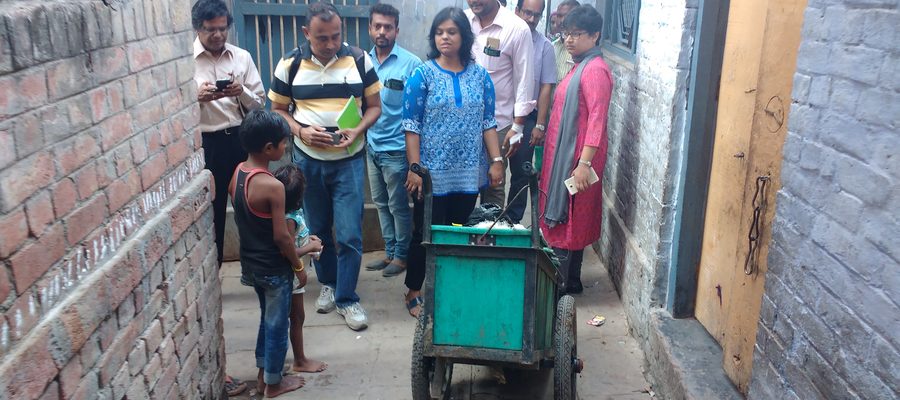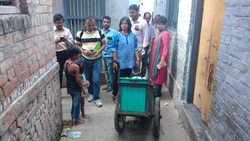Pilot Implementation in Varanasi ward under Development of Holistic Waste Management Strategy

ICLEI South Asia, with support from the United Nations Environment Program (UNEP) is developing a Holistic Waste Management Plan for Varanasi City, in consultation with several stakeholders.
During initial meetings and discussions with Varanasi Nagar Nigam (VNN) and other stakeholders, it was decided to leverage this opportunity to implement and showcase sustainable waste management practices at a pilot scale in Ward 21 in the city. Ward 21 represents a typical ward in the City of Varanasi, with mixed development including residential areas, commercial entities, religious places, educational institutions, densely populated narrow streets and a number of hotels and restaurants. With no door-step collection of waste, littering, open dumping, overflowing bins and burning of waste were prevalent in the ward.
An extensive recce was conducted to understand existing municipal solid waste management practices in the ward. ICLEI South Asia conducted a quantification and characterisation study of waste from various streams in ward 21 over a period of seven days.
Three Swachh Sewaks were hired by ICLEI South Asia to train and support municipal sanitary workers in initiating segregated waste collection in the ward. The Swachh Sewaks, over the period of five months, interacted with residents and other stakeholders of the community to garner their support and initiate segregation practices at the source, provided training to the municipal sanitary workers for segregated collection of waste from households and supported them in improving segregated collection efficiency by developing new beat routes. Through continuous and rigorous one-on-one interactions, residents were educated about the importance and benefits of segregation at source. A mass awareness drive was also conducted. Two bins were distributed to every household– green for wet waste and blue for dry, followed by practical demonstration of waste segregation. Segregated wet waste was transported to the nearby biomethanation facility for processing.
Over the period of five months, a visible improvement is observed in Ward 21, streets are cleaner and there is a significant increase in the quantity of biodegradable waste processed in the decentralized biomethanation plant. Citizens have been sensitized and cooperate with waste collectors. More than 60 percent of households in Ward 21 practice segregation. The initiative has ensured that almost 500 kg of wet waste is transported daily to the biomethanation plant for processing. Waste from street sweeping is reduced. Moreover, since recyclables are not soiled and collected separately, it created opportunities for additional income for waste collectors.
It was envisaged that once the strategy is implemented and institutionalised in one ward, the ‘pilot ward’ can act as ‘torch-bearer’ for replication in other wards.
